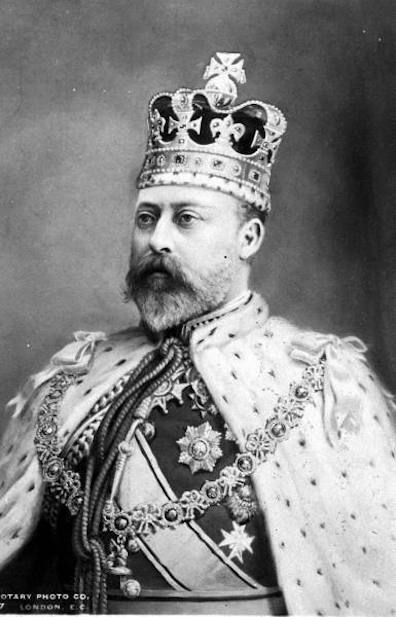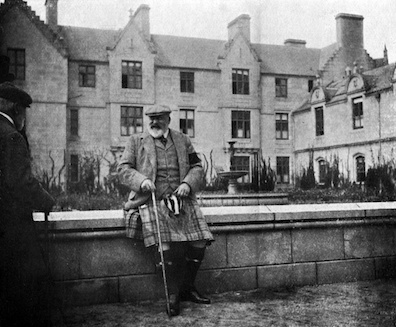The monarch on the British throne in 1904 was King Edward
VII, known before Queen Victoria's death in 1901 as Albert
Edward, Prince of Wales. Predictably, he comes in for less
than reverential treatment in Ulysses. A picture of
the Prince on Mr. Deasy's wall in Nestor suggests that
the unionist schoolmaster does revere him, but in Cyclops
the men in the bar loudly mock the reputation for dissolute
ways that Albert acquired in those days. Lotus Eaters
rather neutrally associates the King with certain units of the
British army, but in Circe that association turns
malevolent as a hallucinated Edward steps in to oversee the
fight between a helpless Stephen and two drunken soldiers.
Mr. Deasy's mantelpiece in Nestor boasts a picture
of "the shapely bulk of a man in tartan
filibegs: Albert Edward, prince of
Wales." The portrait is recent enough that Dirty Bertie, as he
was sometimes called, has assumed his distinctive "bulk." Over
time, the man's waistline came to match his gargantuan
appetites for food, drink, smoking, gambling, and sex. Edward
was also a fancier of thoroughbred horses and an habitué of
the racetrack, a fact which may well explain Deasy's having
coupled "the princely presence" with
portraits of "vanished
horses."
In Cyclops, J. J. O'Molloy observes that "we
have Edward the peacemaker now," referring to the
king's efforts to establish peaceful relations with some of
his European neighbors. Gifford notes that this is "What the
French called Edward VII in the first blush of optimism about
the entente cordiale. It was also a title that he
coveted." In reply, the Citizen blusteringly alludes to the
prince's notorious sexual exploits: "Tell that to a fool....
There's a bloody sight more pox
than pax about that boyo." Joe Hynes sneers at "the
priests and bishops of Ireland doing up his room in Maynooth
in His Satanic Majesty's racing colours and sticking up
pictures of all the horses his jockeys rode," to which Alf
Bergan replies, "They ought to have stuck up all the women he
rode himself." J. J. wryly assures him that "Considerations of
space influenced their lordships' decision."
The Citizen also takes aim at Edward's German origins,
calling him "Edward Guelph-Wettin." Guelph,
Gifford notes, was the family name of the House of Hanover,
and "Wettin is the Prussian version of the Swedish Wetter,
Prince Albert's family name. Queen Victoria dropped the name
Guelph when she married Prince Albert." In 1849, at the tender
age of 8, their son Albert Edward was created "earl of
Dublin" during his mother's state visit to Dublin—a
fact which likewise draws the Citizen's scorn.
Looking at recruiting posters for the British army in Lotus
Eaters, Bloom thinks, "The King's own." Gifford
notes that this phrase "could be applied to a regiment if the
king...had presented it with its colors or if the regiment had
inducted him into honorary membership. The phrase could also
be applied to the Grenadier Guards because, as the first of
the 'household regiments', they would be attached to the
person of the king." This association takes highly concrete
form in Circe when the looming presence of two
aggressive British soldiers makes King Edward materialize, to
peacefully supervise the impending violence.
The apparition is conjured by the words that Stephen speaks
to the threatening Private Carr and Private Compton: "(With
elaborate gestures, breathing deeply and slowly.) You
are my guests. Uninvited. By virtue of the fifth of
George and seventh of Edward. History to blame." (George
V is strangely anachronistic. Edward's successor, he was
crowned King after his father's death in 1910.) "Uninvited" is
no doubt too subtle a dig for the drunken soldiers to notice,
but Stephen excites their wrath when he voices his desire to
be free of imperial and
papal masters: "(He taps his brow.) But in here
it is I must kill the priest and the king." This
second mention makes the king spring to life: "Edward
the Seventh appears in an archway." He has
come to oversee the unfair fight: "Peace, perfect peace. For
identification, bucket in my hand. Cheerio, boys. (He
turns to his subjects.) We have come here to witness a
clean straight fight and we heartily wish both men the best of
good luck."

